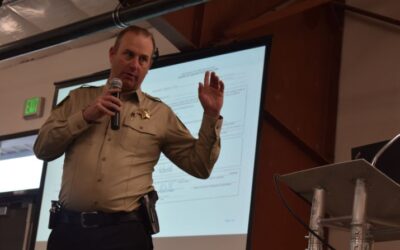Act Now JH, a citizen group focused on redistributing funds from policing to social services, recently won a small victory when Teton County Commissioners approved the 2021 county budget. Commissioners set aside ten thousand dollars for a task force to analyze public safety and community health, with a commitment to help shepherd the process.
“We feel encouraged,” Act Now member Ivan Jimenez said. “We know there is a long road ahead and we are just getting buckled up and ready to do the work.”
Despite Jimenez’s enthusiasm, Jackson is often slow to structural change. This may be endemic to some American cities, but others have responded to the outrage over the police killing of George Floyd with bold action. Some have slashed police budgets and removed police officers from schools. Teton County officials, meanwhile, have signaled they are willing to be part of a group that assesses the community’s public safety needs, and that they will help pay for a facilitator.
Activist Sarah Ross told commissioners there hasn’t been enough improvement on racial justice issues like affordable housing, economic disparity, and protection for immigrants. “I’ve had the same conversations over and over with elected officials, including some of you,” she said. “I believe this is a major inflection point, a huge opportunity we have never had before to leverage the energy and information of this current moment to propel Jackson and Teton County out of the circular conversations we’ve been stuck in for decades.”
For weeks, Act Now JH gave public comment calling for a redistribution of county funds away from law enforcement and into human services, a shift they say would reduce crime and uplift marginalized community members. Their petition garnered more than 1,300 signatures. They issued a detailed report about “defunding” versus reform, and how Jackson could implement new public safety programs based on other communities.
Though commissioners refrained from cutting the sheriff’s budget—instead adding more money to fund dispatcher salaries—they were moved by residents’ pleas to consider alternative models of public safety. A June 30 budget meeting included several minutes of discussion about how much money to allocate to a task force. Commissioner Mark Newcomb felt it was important to make such funding a line item in the budget, not a part of a miscellaneous slush fund.
“I would be concerned that if we don’t have any money allocated to this effort, it might make it difficult to take meaningful action,” he said. “I would like to be sure there is some money available for a definitive first step.”
According to Act Now member Bradley Smith, the next step will be identifying the stakeholders to be at the table. He envisions a group made up of law enforcement, elected officials, EMTs, mental health providers, victim services, and other health and human service agencies. He hopes to include a consultant who has advised other cities on how to create alternative systems of care focused on restorative justice.
“We would love to have someone at the table who has helped establish one of those programs,” Smith said.
One alternative public safety model that the task force will likely explore is a program in Eugene, Oregon, that sends mental health providers rather than law enforcement officers out to mental health-related calls for service.
The program, CAHOOTS (Crisis Assistance Helping Out On The Streets), launched in 1989,saves the city of Eugene an estimated $8.5 million in public safety spending annually, according to its website.
CAHOOTS is one of the examples Act Now JH presented to local officials as a potential model for Jackson. Sheriff Matt Carr has expressed interest, as have Commissioners Greg Epstein and Luther Propst.
Small Steps
In their report, Act Now JH highlighted several communities of a similar size to Jackson that have implemented immediate change to law enforcement in answer to the nationwide calls to end police brutality. The school board in Winona, Minnesota, (population 27,600) voted in June to remove police officers from area schools. The city commission in Helena, Montana, (population 28,000) has committed to a series of work sessions to review the police department’s policies and procedures and suggest changes.
While officials in other cities are taking action themselves, Jackson leaders are placing the onus on community members. On June 15, the Jackson Town Council passed the town’s 2021 budget without additional cuts to police beyond those due to budget impacts from COVID-19. At the meeting, Mayor Pete Muldoon said if the council made a “knee-jerk reaction” and cut the police budget, the next council would put those funds back in place. He told community activists they needed to do more work to get community buy-in.
“Each and every one of you who have emailed or called or written need to continue to work, to show up, and to continue to have hard conversations with other community members and to educate ourselves on the issue,” Muldoon said.
Similarly, county commissioners want Act Now JH to do more work. Activists have met privately with several commissioners, including Propst, Epstein, and Natalia Macker, who have encouraged them to keep the issue alive and have advised them on how best to present their ideas before the board of commissioners.
Propst said there was no way the board of commissioners would suddenly proclaim sweeping changes to public safety. “You’re not going to make policy reform unless you bring a group together to talk and research and go back and forth on it,” Propst said. “It’s really up to Act Now JH folks to figure out how it should work.”
“You’re not going to make policy reform unless you bring a group together to talk and research and go back and forth on it. It’s really up to Act Now JH folks to figure out how it should work.”
– Teton County Commissioner Luther Propst
Attias acknowledged one way to look at the government response is that they are tasking Act Now JH with providing free consulting. Already the group has provided electeds with numerous resources that explain the principles of reallocating funds from law enforcement to human services. However, she isn’t put off by the fact that officials aren’t yet ready to take action or cut funding.
“Yes, the way things seem to be happening here is different from the other places we’ve researched in that a lot of responsibility has been put on us to figure out what to do next,” Attias said. “But that’s not necessarily a bad thing. We get to be an integral part of the conversation and planning.”
Attias and other Act Now JH members see this opportunity as a boon. For them, keeping the focus on racial justice and defunding the police is critical. They don’t want to soften their message. According to Smith and Jimenez, the group has had internal debates about using the term “defund,” and have decided to stick with it out of principle.
“Our direction and praxis are rooted in hundreds of years of the abolitionist movement,” Jimenez said. “People have been doing this work for centuries. They have put their lives on the line. They did not get to go home and kick back and relax after a day of fighting for civil rights and racial justice like we do.”
Modern abolitionists argue that reform doesn’t work. Instead, they seek to dismantle the criminal justice system and create alternatives to punishment. Scholars and activists Angela Davis and Ruth Wilson Gilmore are credited as the leaders of the prison abolition movement. They founded the organization Critical Resistance in 1997 to address what they call the prison industrial complex, which they define as “the overlapping interests of government and industry that use surveillance, policing, and imprisonment as solutions to economic, social and political problems.”
Act Now JH’s Smith said he knows the concept of defunding law enforcement makes some people uncomfortable, and maybe that’s okay.
“If you want to talk to me about nuance, and realize I’m not crazy, I’m not a professional protester from New York who has flown in to mess up your rural lifestyle, then I would love to talk to you,” he said.
“If you want to talk to me about nuance, and realize I’m not crazy, I’m not a professional protester from New York who has flown in to mess up your rural lifestyle, then I would love to talk to you.”
– Bradley Smith, Act Now JH
Epstein hopes the radical messaging won’t inhibit a productive community conversation. He met with Act Now JH members recently and asked them to think beyond a one-size-fits-all solution. “Let’s work together and have a community conversation about what law enforcement looks like in Teton County without burning it all down,” Epstein said.
He isn’t turning a deaf ear to their concerns, though. “They have a long wish list of things and some of them are obtainable within a decent time frame,” Esptein said. “Some of them are absolutely systemic and are going to take maybe even a generational shift.”
That wish list includes removing the school resources officer from Teton County schools, conducting an in-depth audit of local law enforcement agencies, and refraining from hiring for any unfilled positions within the sheriff’s or police departments.
The only immediate area of mutual agreement between Act Now JH, the sheriff, and county commissioners was giving dispatchers a pay raise and committing to hiring at least two Spanish-speaking dispatchers to better serve the Latinx community. For months, Carr has been asking for more money for dispatcher starting salaries, hoping to attract more applicants to the perennially understaffed department. The board of commissioners finally agreed at the budget approval meeting.
Propst celebrated the decision as a win for gender pay equity. Dispatch is often staffed by women who make much less than their colleagues in patrol. Dispatch starting salary was $46,791. In the new fiscal year, that will go up to $54,167, to match starting salaries of patrol and detention officers.
Still, the irony was not lost on some members of Act Now JH, that they came in asking for defunding to ensure the safety of Black, Indigenous and people of color, and instead helped achieve more funding for the sheriff’s budget.
“We came asking how we can better protect our Black and Brown community members, and our first step will be to pay white women more,” Sofia Schwartz said at the budget meeting.
According to Macker, commissioners will next discuss the law enforcement task force Monday, July 27, with input from the public.
In the meantime, Act Now JH members are formulating the questions they’d like the task force to address. Jimenez said they want to know more about calls for service. “We want to get a lot more detail about how often we need to be sending out an armed law enforcement officer.”
The sheriff’s dispatch center handles calls for more than the sheriff’s office, They take all 911 calls, as well as calls for the Jackson Police Department, Search and Rescue, Fire/EMS, Teton Village fire department, and the National Elk Refuge. The calls for service they log consist of any event initiated by an officer, a citizen, or dispatch. Of the 44,012 calls for service in 2019, approximately 17,000 had something to do with traffic, driving violations, parking or vehicle registration. By comparison, calls that appeared to be criminal in nature, were less frequent. A few examples include 12 calls for residential burglary, 48 calls for domestic violence, one call for homicide, and 235 calls for theft.
Where To Go From Here
For now, the law enforcement assessment task force exists in concept-only, and a nascent one at that. Commissioners and Act Now JH members say they want many more county agencies at the table to help decide priorities. Though Act Now JH members feel tasked with more footwork, Macker says no official ask was made of them.
Macker welcomes the nudge to take a deeper dive into how the county approaches law enforcement. But perhaps more importantly she is encouraged by the uptick in public involvement in local government and policymaking.
“As we hear from people who have different lived experiences, we have the opportunity to do things differently,” she said. “We’ve set up certain ways of operating government. Maybe it doesn’t need to be like that.”
“As we hear from people who have different lived experiences, we have the opportunity to do things differently. We’ve set up certain ways of operating government. Maybe it doesn’t need to be like that.”
– Natalia D. Macker, Chair, Board of Teton County Commissioners
While exploring new ways of doing things is exciting to Macker, she knows it may be uncomfortable for others. “It’s easy to be scared when you’re presented with a new framework,” she said. “It’s easier to make incremental changes than to change the entire system.”
Fear of the unknown shouldn’t hold people back, she says. “When we get more diverse voices solving a problem, our collective wisdom goes up.”
What that wisdom will be and where it will lead to remains to be seen.






